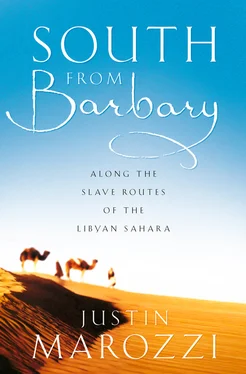We thought we could manage that. Abd an Nibbi, who was deputizing for Abu Amama during the latter’s absence in the southern town of Ghat, welcomed us to a makeshift camel enclosure on a patch of wasteland. He looked faintly amused, and at the same time – was it our imagination? – crafty. There were seven Mehari camels inside, of which it took no expertise to see that two were clearly unsuitable for a long journey. They were puny youngsters, half the size of the others. It did not leave much room for choice. We needed five.
At close quarters, they looked terrifying. Huge hulks of beasts with mighty, towering legs, together they formed a striking picture of grace and power. The first Mehari camel Richardson had seen walking into the medina of Ghadames had had a similar effect on him. ‘It amazed me by its stupendous height. A person of average size might have walked under its belly.’ An Arab philologist suggested to him the word Mehari derived from Mahra, the Arabian province on the south-east coast adjoining Oman, from where the animal was supposed to have originated. ‘This remarkable camel, which is like the greyhound amongst dogs for swiftness and agility, and even shape, they train for war and riding like the horse,’ he wrote. The Touareg warriors of Ghadames sitting astride their Meharis looked ‘splendid and savage’ to him.
Massive, disdainful and apparently in no mood to be paraded around for our convenience, these Meharis roared terribly, jerked from one side to another and lashed out at the handlers with their legs to show their displeasure. Not a man to be cowed by mere animals, Abd an Nibbi entered the fray. Masterfully he subdued them, throwing a rope around their heads, pulling down their necks and grabbing their nose-rings with supreme assurance. Once he had hold of the nose-rings he tugged at them vigorously until the camels were completely cowed. Within seconds they had been transformed from proud, dangerous-looking beasts into the meekest creatures conceivable. Abd an Nibbi shot us a knowing look, as if to make sure we had witnessed this demonstration of camel skills. I remembered Ned’s advice of the night before and thought ruefully of what amateurs we were. There was no going back now. We had to look convincing. One by one, Abd an Nibbi brought the five camels in front of us.
I looked across at Ned, who had begun to scribble notes with what I imagined was the practised calm of a professional camelbuyer. He looked every bit the part. It was time to join the act. Together, we walked slowly around each one, trying to look as though it was the most normal thing in the world. We bought camels all the time, of course. We nodded sagely, conferred and shook our heads regretfully (we did not want to look over-eager), checked their legs (all of which to our untrained eyes looked crooked), stared into their eyes, slapped their flanks with what we hoped was the air of connoisseurs, and pondered carefully. Ned continued to take notes throughout the inspection. Mohammed Ali pottered about here and there, pausing occasionally to admire a particular animal. ‘Ohhh, really, these are good camels, Mr Justin. They are in good condition.’
At this initial viewing, three of the camels appeared particularly impressive. Cream in colour, they exuded a definite aristocratic hauteur and swaggered about with the greatest nonchalance. They paid us little attention beyond a certain sneering look before continuing their perambulations. Another, a barrel-chested brown, did not seem to be on good terms with the whites, but looked a robust mount. A handsome and effeminate beige, slighter than the others but with the demeanour of a lively thoroughbred, completed the party.
Ned looked up from his notes for a second. ‘Get them to trot,’ he said to me, as though addressing his camel boy. All that training on horseback in the Andes had not been for nothing. He was warming to the task. I looked at the tall beast beside me and wondered how I could get it to do anything, let alone trot. Then I remembered it was essential to show no fear in front of a camel. Grabbing the rope that was attached to its nose-ring, I ran off with the first. Disturbed from an otherwise peaceful afternoon munching hay, the camel appeared to think this was the greatest impudence but within seconds broke into a light trot behind me. At last. I was in control.
‘That’s good,’ said Ned, with the same air of authority. ‘Keep going.’
We took it in turns to take them trotting and got them to kneel down and stand up again repeatedly. Whether we presented a convincing picture to the Ghadamsis around us was a moot point. Judging by his face, Abd an Nibbi was struggling hard not to laugh.
Undaunted, Ned continued taking notes. I saw them several days later. They went something like this:
(1) 13 years old. Wound on front left leg. Slightly knock-kneed.
(2) 12 years old.
(3) White. Bobbles on nose.
(4) ‘V’ on neck. Good temperament.
(5) Brown.
All were for sale, Abd an Nibbi told us with a confident expression that indicated he knew something we did not. We started discussing prices, at which point he pulled out his own paperwork. It consisted of a letter from Abu Amama saying on no account were the camels to be sold for a dinar less than the figure he had quoted me on my last trip. In other words, they were going for £800 each. We could take it or leave it. There was to be no haggling.
We returned to Othman’s house to think it over.
‘What do you think?’ asked Ned.
‘It’s a lot of money,’ I replied, ‘and I don’t like the way there’s no haggling.’
It was too much money, certainly. Our problem was that Abu Amama was not even particularly keen on selling the camels. He would have preferred to hire them to us, he had said before, since if he sold them he would then have to make a long journey south to Niger to replace them. Meharis were relatively rare in Libya, he had explained, freely admitting that this was why they were so expensive. More importantly, if we were determined, as we were, to buy our camels here, we had little alternative, and everyone in Ghadames knew it.
‘What do you think are our options?’ Ned went on.
Short of having a look for camels down in Ghat or, less practically, Kufra (a little under 900 miles away as the crow flies, much more by road), there appeared to be no alternative. Besides, we would lose valuable time leaving Ghadames and would still have to pay the transportation costs to bring the camels back to our starting-point. I didn’t think there was much we could do but pay the exorbitant sum demanded.
‘You know what Anthony Cazalet would say in this sort of situation?’ Ned said.
‘Something about being bloody cold no doubt.’
‘No, he’d say it’s time to throw money at the problem.’
It was. There seemed nothing else for it. We returned to our lodgings and, after holding off an attempt by Abd an Nibbi to dispute the black market exchange rate, handed over several thousand dollars. Everyone was smiles. The transaction was complete. The camels were ours. Now we needed a guide. The next morning Mohammed Ali arrived with a message from Ibrahim saying one had been found. ‘You see, Mr Justin, really we are in good condition. I tell you Ibrahim help with everything, alhamdulillah. ’
Things were looking up. We trooped back into the hole in the wall to find a fat man with two lazy eyes waiting for us. With him and Mohammed Ali in one room, it was almost impossible to know who was speaking to whom. He shook hands without warmth and was introduced to us as Mohammed Ramadan from Awbari. There was something unpleasant about his manner. He did not seem at all interested in getting to know the people with whom he was volunteering to travel several hundred miles across the Sahara. This was a simple business transaction, no more, no less. In a bullying tone, he told us he knew the area between Ghadames and Idri intimately and was ready to go with us. We started to discuss the route in more detail and asked him how he travelled in the desert. Things went rapidly downhill from there and his manner became ever more aggressive and confrontational. He would only travel by camel if we had a car as back-up, he insisted. It would carry food and water supplies for us and the camels. Each day his sidekick would drive ahead of us for thirty miles or so and in the evening we would rejoin the car for dinner. Mohammed Ali looked embarrassed. He knew this was not what we wanted to do.
Читать дальше


![Theresa Cheung - The Dream Dictionary from A to Z [Revised edition] - The Ultimate A–Z to Interpret the Secrets of Your Dreams](/books/692092/theresa-cheung-the-dream-dictionary-from-a-to-z-r-thumb.webp)









